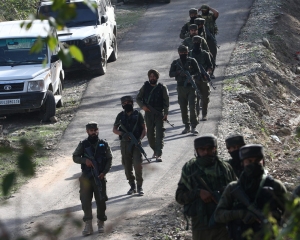The political landscape of Uttar Pradesh has
undergone a dramatic transformation as recent
election results reveal a significant setback for
the Bharatiya Janata Party and revival of
Congress.
Despite the heightened religious fervour
following the consecration of the Ram temple in
Ayodhya in January 2024, the BJP failed to
secure a victory, reminiscent of its loss in the
1993 elections.
Congress candidate from Allahabad, Ujjawal
Raman Singh, who won the election from
Allahabad, told this reporter: "UP ne to sara
game hi badal diya (UP has changed the whole
game)."
Historical Parallels: 1992 and 2024
On December 6, 1992, the Babri mosque was
demolished, an event that triggered widespread
communal unrest and led to the fall of Kalyan
Singh's government in UP. The atmosphere
across the state was charged with religious
sentiment, and the BJP was seen as the saviour
of Hindutva. However, in the subsequent 1993
elections, despite the prevailing Ram wave, the
BJP was defeated by the combined force of the
Samajwadi Party and Bahujan Samaj Party,
marking a significant political shift. Mulayam
Singh Yadav was the chief minister.
Fast forward to 2024, and history seems to have
repeated itself. The consecration of the Ram
temple on January 22, 2024, once again stirred a
wave of religious fervour across UP. Yet, four
months later, the election results did not favour
the BJP.
The BJP lost in Ayodhya, the city Modi
transformed into a modern city by building
airports and improving infrastructure. Arun
Govil, the man who played the role of Lord Ram
in tele serial Ramayana, lost his election in
Meerut. Kalyan Singh's son Rajveer Singh too
lost from Etah.
"In this election, it seems Lord Ram has deserted
the BJP," chuckled Rajendra Chaudhary, the SP
spokesman.
"BJP should know that it cannot get votes by
chanting Ram Ram. You need to perform," he
said.
"The party was aspiring for '400 paar', but has
failed to cross even the 300-mark," he said.
The mayhem of ballots did not spare ministers in
the Narendra Modi government as five of them,
namely Smriti Irani (Amethi), Mahendra Pandey
(Chandauli), Kaushal Kishore (Mohanlalganj),
Sanjiv Balyan (Muzaffarnagar) and Ajay Mishra
Teni (Kheri) lost elections. Maneka Gandhi too
lost from Sultanpur.
Major winners include Prime Minister Narendra
Modi (Varanasi), Rahul Gandhi (Rae Bareli),
Hema Malini (Mathura) and Rajnath Singh
(Lucknow).
The National Democratic Alliance led by the
BJP was leading in only 39 constituencies, while
the INDIA bloc, a Congress-led alliance, had
secured 40 seats, with others leading in one seat.
This is a stark contrast to the 2019 results, where
the NDA had won 64 seats, the BSP 10, the SP
five and Congress one.
Political analysts suggest that, similar to 1993,
voters in UP once again cast their ballots along
caste lines rather than on the Ram mandir issue.
The BJP's ambitious slogan, 'Ab ki baar 400
paar' appears to have backfired, as it fueled
concerns about potential constitutional changes
under a robust BJP victory. The Congress
capitalised on these fears, leading to a
significant surge in their support
"The way Bahujan Samaj Party's core voters got
scattered, it is very clear that Dalits this time
voted for the INDIA bloc," commented Preetam
Srivastava, a political analyst.
In 2019, the BJP achieved its highest-ever vote
share, winning 62 seats with many MPs securing
over 50 per cent of the votes polled. However, in
the 2024 elections, the party witnessed an
unexpected decline in vote percentage. Despite
BJP's historical dominance in UP, having
emerged as the largest party in 1991, 1996 and
1998, this election marked a notable departure
from its previous successes.
The BJP-led alliance in UP included the
Rashtriya Lok Dal, Suheldev Bhartiya Samaj
Party, and NISHAD Party. The INDIA bloc
comprised Congress, Samajwadi Party, and
other influential parties, while the Bahujan
Samaj Party contested the election
independently.























